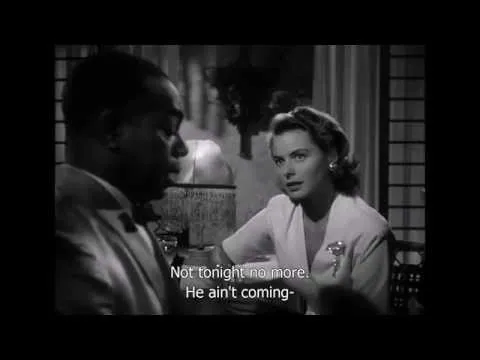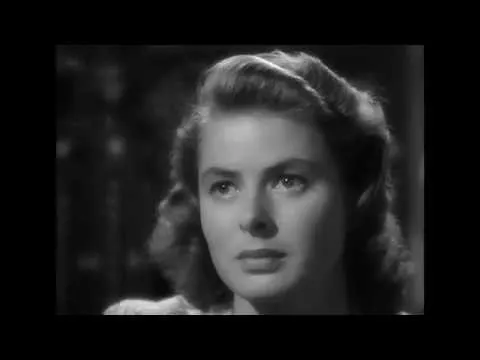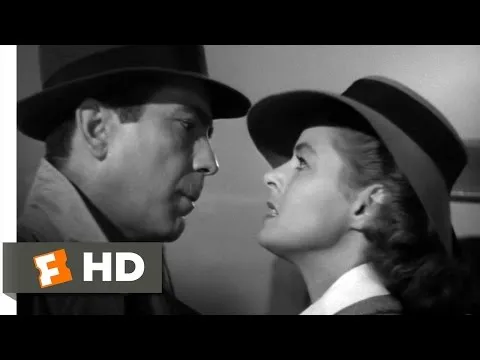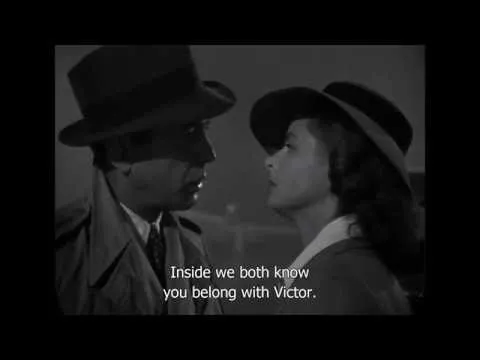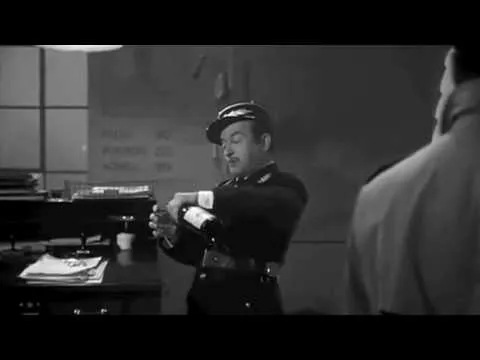Love, loss and redemption, a devastating romance. Two lovers see their union sacrificed in the midst of World War II.
Between Rick Blaine (Humphrey Bogart) and Ilsa Lund (Ingrid Bergman), there is no impediment to the blossoming of love, not even the war or the Nazi occupation. They were happy in Paris in a small apartment despite the drama threatening the city, Ilsa becomes aware of their ill-timed love when she says, "The world collapses and we fall in love".
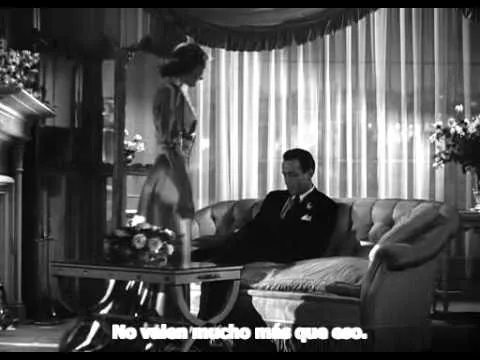
Source
While in Paris, Rick asks Ilsa to marry him as they plan their trip to Marseilles to escape the Nazis, she did not show up at the station, sending a note of apology and wishing him good luck. When they met Ilsa believed that her husband had died in a concentration camp, but just the day before the march to Marseille with Rick, her husband reappears his name Victor Laszlo, a Czech resistance leader who manages to escape from the Nazi concentration camp where he was confined.
Casablanca is a city located in Morocco, and is also part of France not occupied by the Nazis. It is where the homeless and anti-fascists arrive, where they stop over before taking the plane from Lisbon to America; it is the place where the resistance leaders have a respite.
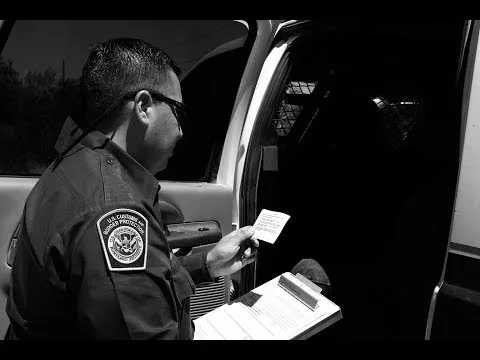
Source
Rick is the owner of the most famous cafe in the city. The police and the resistance know our protagonist for selling arms to Ethiopia to fight against the Italians and for participating in the Spanish Civil War with the Republicans, although he claims he did it for money.
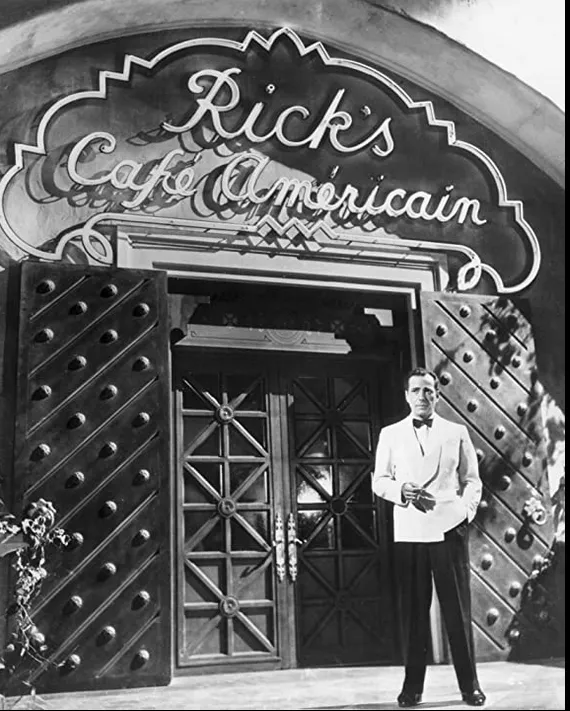
Source
In the city, visas and laissez-passer are trafficked.
On the way to Casablanca two German correspondents are assassinated and the laissez-passers they were carrying disappear. Different arrests take place, although the corrupt Captain Renault, in command of the gendarmerie, reserves the most important one for that night, which he will carry out in Rick's American Café, trying to please Major Strasser, a Gestapo officer. The wanted man is Victor Laszlo.
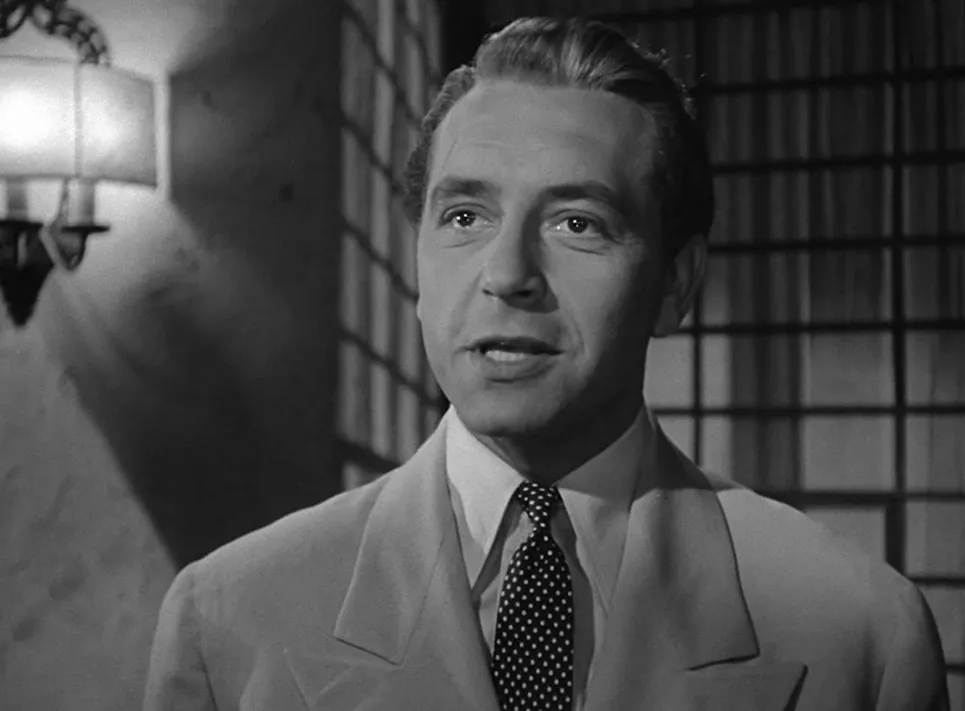
Source
A criminal named Ugarte, like Renault, deals in visas, and comes to Rick's cafe asking him to help him hide for an hour the safe-conducts stolen from the Germans, which he plans to sell to Laszlo and his wife Ilsa.
When the Laszlo couple comes to the café, Ilsa recognizes Sam, pianist and singer, and asks him to play for her a song that reminds her of her past, "As time goes bye", he plays it and provokes the fury of Rick who had forbidden him to play it.
Rick meets Ilsa and her husband breaks several of his habits: for the first time she sits at the table with a client and he is the one who invites, remembering that they met in Paris where they saw each other for the last time the day the Nazis occupied the city.
As the couple leaves, Rick asks Sam to sing the song again, drinking and remembering the happy days in Paris when he asked Ilsa to marry him.
Ilsa goes to see Rick to explain her absence that day at the train station in Paris, but he rejects her excuses and refuses to listen to them. At the same time Victor Laszlo tries to obtain the safe-conducts by going to Ferrari, head of the black market in Casablanca, who tries to buy them from Rick without success.
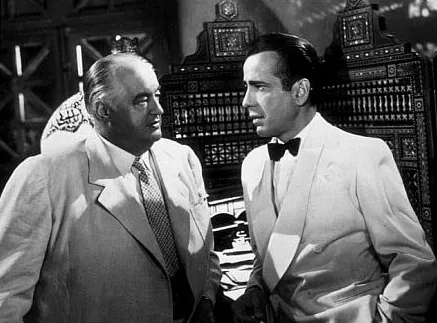
Source
Strasser offers Laszlo the visa on the condition that he gives the names of the leaders of the resistance in the occupied countries, and sees how in Rick's cafe, he unites all the refugees, making them sing the Marseillaise to the astonishment of the Germans who sing one of their hymns.
Rick talks to Ilsa again, trying to hear the reasons for her abandonment.
Victor heads to a resistance meeting, then Ilsa goes to see Rick and demands that he hand over the safe-conducts, threatens him with a gun. She does not dare to shoot, and admits that she still loves him and cannot forget him, telling him the reasons why she left him.
Carl, the bar waiter and member of the resistance, and Victor arrive at Rick's cafe after fleeing from the police intervention at the meeting they were attending. Renault bursts into the bar and arrests Laszlo.
Rick convinces Renault to release Laszlo by telling him that he will later arrest him for possession of the safe-conducts that Rick himself will give him. This way Ilsa will be free and will be able to go with Rick to Lisbon.
Before that, Rick sells Ferrari his business on the condition that he does not fire any of his employees.
When Renault tries to arrest Laszlo, as he had agreed with Rick, the latter avoids him by threatening him with a gun. After these events they will all go together to the airport, where Rick convinces Ilsa to leave with Laszlo, who will need her more than him, since if she stays there they will both be arrested.
It all takes place before the bombing of Pearl Harbor in 1941, the protagonist goes from being an idealistic man to become a cynical one given what happened with Ilsa in Paris.
Bogart and Bergman's performances are so electrifying that they convey the feeling of being in love just by looking at each other. These lovers sacrifice their love for the struggle for freedom, something that would be impossible for Victor Laszlo to achieve apart from Ilsa and Rick knows it.
The first time I saw the movie, I was a child who still did not understand the meaning of the word love, I did not know what a war was and how it could affect people. When I grew up I saw the film for the second time and understood the context in which it was set, an antihero in love, a beautiful woman who is torn between true love for a man and admiration for another.

Source
Bogart's performance is sensational, looking both tough and romantic in this film. Bergman, here beautiful and free, sacrifices his love for a sense of commitment and duty. The film symbolizes the United States leaving isolationist and selfish policies at risk to help others, but by its own values it becomes a love story that manages to transcend the values of democracy against Nazi National Socialism.
Always in my mind will be the scene of the Marseillaise Hymn, for what it conveys: the evil Major Strasser, drunkenly intoned with other Germans a nationalist hymn, then, Victor Laszlo is put in front of the club orchestra that, after being authorized by Rick, plays the Marseillaise. This scene represents a patriotic chant against fascism, all present join in until the Germans are silenced. The close-up of the guitarist's face seems to represent freedom and the singer is transfigured to tears. Sublime scene.
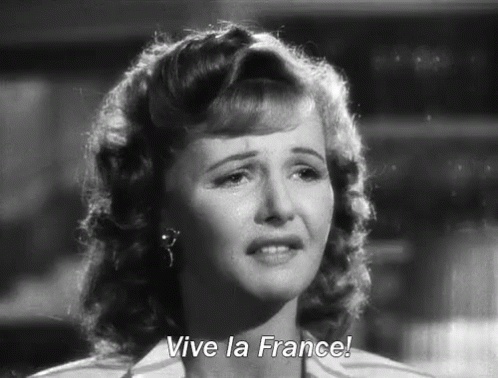
Source
The iconic song As time goes by that Sam, Rick's great friend in the film, resists playing on the piano when Ilsa asks him to, is a song that manages to open the wounds and marks his reunion with his great love, bringing back memories that tear him apart.

The sacrifice Rick makes by letting his great love get on that plane with another man who as a resistance leader fights for the freedom of Europe against the Nazis is memorable, our protagonist understands that the problems of three people are insignificant in the face of the possibility of achieving freedom. A dialogue between Rick and Ilsa represents the central idea of the film:
- You say it because you want me to leave.
- I say it because it's the truth. We both know your place is with Victor. You are part of his work. If you don't go with him, it will weigh on you. Maybe not now, but later, all your life.
- What about us?
- We'll always have Paris. We didn't have it until you came to Casablanca. Last night we got it back.
- And I said I'd never leave you.
- You'll never leave me. I also have work to do. You can't be part of what I have to do.
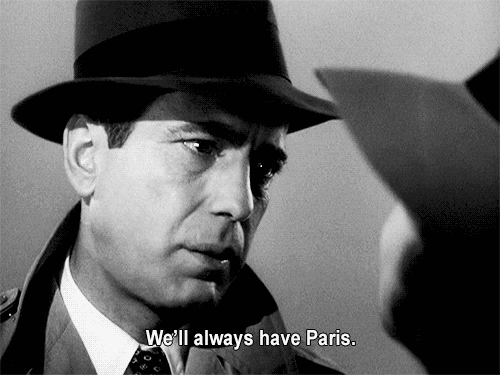
Source
Many people think that Casablanca is the greatest romantic film of all time with a cast that in addition to Humphrey Bogard, and Ingrid Bergman includes Peter Lorre, Sydney Greenstreet, Claude Rains, Dooley Wilson and Paul Henreid.
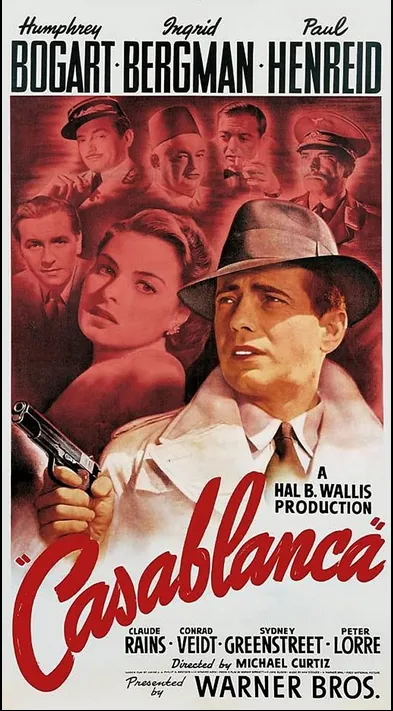
Source
The film's script was rewritten and revised several times. Michael Curtiz, the film's director, shot the film in chronological order, and the actors learned what the script said as they shot their scenes. Ingrid Bergman did not know who her character would stay with, which had the effect of making her performance more emotionally realistic. The actress commented that she didn't know which man she was supposed to fall in love with and so the rumor spread that they were shooting a film that they didn't know how it was going to end.
This is a film that mixes romanticism, humor, drama and war that managed to penetrate the hearts of the public worldwide, and yes, it is pro-American propaganda, which in the collective unconscious manages to transcend thanks to the beautiful story of love and sacrifice of its protagonists, with memorable phrases like: "Here's looking at you kid", "We'll always have Paris", "Play it, Sam", "Of all the gin joints in all the towns in all the world, she walks into mine."
Thank you appreciated community for taking the time to read my post, which besides allowing me to refresh an irrefutable classic, serves me to participate in the CineTV Contest : Romantic Movies I Love to Watch Link Here.
As always I hope that the interest in classic and cult cinema will grow in the community, I wish very good luck to all participants in this initiative.

Spanish Version
Amor, pérdida y redención, un romance devastador. Dos amantes ven sacrificada su unión en plena Segunda Guerra Mundial.
Entre Rick Blaine (Humphrey Bogart) e Ilsa Lund (Ingrid Bergman) no hay impedimento para que florezca el amor, ni siquiera la guerra o la ocupación nazi. Eran felices en París en un pequeño apartamento a pesar del drama que amenazaba a la ciudad, Ilsa se da cuenta de su inoportuno amor cuando dice: "El mundo se derrumba y nosotros nos enamoramos".

Fuente
Estando en París, Rick le pide a Ilsa que se case con él mientras planean su viaje a Marsella para escapar de los nazis, ella no se presentó en la estación, enviando una nota de disculpa y deseándole buena suerte. Cuando se conocieron Ilsa creía que su marido había muerto en un campo de concentración, pero justo el día antes de la marcha a Marsella con Rick, su marido reaparece llamándose Victor Laszlo, un líder de la resistencia checa que consigue escapar del campo de concentración nazi donde estaba confinado.
Casablanca es una ciudad situada en Marruecos, y también parte de Francia no ocupada por los nazis. A ella llegan los vagabundos y los antifascistas, donde hacen escala antes de tomar el avión de Lisboa a América; es el lugar donde los líderes de la resistencia tienen un respiro.

Fuente
Rick es el dueño de la cafetería más famosa de la ciudad. La policía y la resistencia conocen a nuestro protagonista por vender armas a Etiopía para luchar contra los italianos y por participar en la Guerra Civil española con los republicanos, aunque él asegura que lo hizo por dinero.

Fuente
En la ciudad se trafica con visados y salvoconductos.
De camino a Casablanca dos corresponsales alemanes son asesinados y los salvoconductos que llevaban desaparecen. Se producen diferentes detenciones, aunque el corrupto capitán Renault, al mando de la gendarmería, se reserva la más importante para esa noche, que llevará a cabo en el American Café de Rick, intentando complacer al mayor Strasser, oficial de la Gestapo. El hombre buscado es Víctor Laszlo.

Fuente
Un delincuente llamado Ugarte, al igual que Renault, trafica con visados, y acude al café de Rick pidiéndole que le ayude a esconder durante una hora los salvoconductos robados a los alemanes, que piensa vender a Laszlo y a su esposa Ilsa.
Cuando el matrimonio Laszlo llega al café, Ilsa reconoce a Sam, pianista y cantante, y le pide que toque para ella una canción que le recuerda su pasado, "As time goes bye", él la toca y provoca la furia de Rick que le había prohibido tocarla.
Rick conoce a Ilsa y su marido rompe varias de sus costumbres: por primera vez se sienta a la mesa con un cliente y es él quien invita, recordando que se conocieron en París donde se vieron por última vez el día que los nazis ocuparon la ciudad.
Mientras la pareja se va, Rick le pide a Sam que vuelva a cantar la canción, bebiendo y recordando los días felices en París cuando le pidió a Ilsa que se casara con él.
Ilsa va a ver a Rick para explicarle su ausencia aquel día en la estación de tren de París, pero él rechaza sus excusas y se niega a escucharlas. Al mismo tiempo, Victor Laszlo intenta conseguir los salvoconductos acudiendo a Ferrari, jefe del mercado negro de Casablanca, que intenta comprárselos a Rick sin éxito.

Fuente
Strasser ofrece a Laszlo el visado con la condición de que dé los nombres de los líderes de la resistencia en los países ocupados, y ve cómo en el café de Rick, éste une a todos los refugiados, haciéndoles cantar la Marsellesa ante el asombro de los alemanes que entonan uno de sus himnos.
Rick vuelve a hablar con Ilsa, intentando escuchar los motivos de su abandono.
Víctor se dirige a una reunión de la resistencia, entonces Ilsa va a ver a Rick y le exige que le entregue los salvoconductos, le amenaza con una pistola. Ella no se atreve a disparar, y admite que aún le ama y no puede olvidarle, contándole las razones por las que le dejó.
Carl, el camarero del bar y miembro de la resistencia, y Víctor llegan al café de Rick tras huir de la intervención policial en la reunión a la que asistían. Renault irrumpe en el bar y detiene a Laszlo.
Rick convence a Renault para que libere a Laszlo diciéndole que más tarde le arrestará por posesión de los salvoconductos que el propio Rick le entregará. De este modo, Ilsa quedará libre y podrá ir con Rick a Lisboa.
Antes, Rick vende a Ferrari su negocio con la condición de no despedir a ninguno de sus empleados.
Cuando Renault intenta detener a Laszlo, como había acordado con Rick, éste lo evita amenazándole con una pistola. Después de estos acontecimientos irán todos juntos al aeropuerto, donde Rick convence a Ilsa para que se vaya con Laszlo, que la necesitará más que a él, ya que si se queda allí ambos serán detenidos.
Todo transcurre antes del bombardeo de Pearl Harbor en 1941, el protagonista pasa de ser un hombre idealista a convertirse en un cínico dado lo ocurrido con Ilsa en París.
Las interpretaciones de Bogart y Bergman son tan electrizantes que transmiten la sensación de estar enamorados con sólo mirarse. Estos amantes sacrifican su amor por la lucha por la libertad, algo que sería imposible de conseguir para Victor Laszlo al margen de Ilsa y Rick lo sabe.
La primera vez que vi la película, era un niño que aún no entendía el significado de la palabra amor, no sabía lo que era una guerra y cómo podía afectar a las personas. Cuando crecí vi la película por segunda vez y entendí el contexto en el que se desarrollaba, un antihéroe enamorado, una hermosa mujer que se debate entre el verdadero amor por un hombre y la admiración por otro.

Source
La actuación de Bogart es sensacional, luciendo a la vez duro y romántico en esta película. Bergman, aquí bella y libre, sacrifica su amor por un sentido del compromiso y del deber. La película simboliza a los Estados Unidos dejando de lado las políticas aislacionistas y egoístas para ayudar a los demás, pero por sus propios valores se convierte en una historia de amor que consigue trascender los valores de la democracia frente al nacionalsocialismo nazi.
Siempre estará en mi mente la escena del Himno de la Marsellesa, por lo que transmite: el malvado Mayor Strasser, entona ebrio con otros alemanes un himno nacionalista, luego, Víctor Laszlo se pone al frente de la orquesta del club que, tras ser autorizado por Rick, toca la Marsellesa. Esta escena representa un canto patriótico contra el fascismo, todos los presentes se unen hasta que los alemanes son silenciados. El primer plano de la cara del guitarrista parece representar la libertad y el cantante se transfigura hasta las lágrimas. Una escena sublime.

Fuente
La icónica canción As time goes by que Sam, el gran amigo de Rick en la película, se resiste a tocar en el piano cuando Ilsa se lo pide, es una canción que consigue abrir las heridas y marca el reencuentro con su gran amor, trayendo recuerdos que lo desgarran.

El sacrificio que hace Rick al dejar que su gran amor suba a ese avión con otro hombre que como líder de la resistencia lucha por la libertad de Europa contra los nazis es memorable, nuestro protagonista entiende que los problemas de tres personas son insignificantes ante la posibilidad de alcanzar la libertad. Un diálogo entre Rick e Ilsa representa la idea central de la película:
- Tú lo dices porque quieres que me vaya.
- Yo lo digo porque es la verdad. Ambos sabemos que tu lugar está con Víctor. Eres parte de su obra. Si no te vas con él, te pesará. Tal vez no ahora, pero sí después, toda tu vida.
- ¿Y nosotros?
- Siempre tendremos París. No lo teníamos hasta que llegaste a Casablanca. Anoche lo recuperamos.
- Y dije que nunca te dejaría.
- Nunca me dejarás. También tengo trabajo que hacer. No puedes ser parte de lo que tengo que hacer.
 )
)
Fuente

Fuente
El guión de la película fue reescrito y revisado varias veces. Michael Curtiz, el director de la película, filmó la película en orden cronológico y los actores aprendieron lo que decía el guión mientras filmaban sus escenas. Ingrid Bergman no sabía con quién se quedaría su personaje, lo que tuvo el efecto de hacer que su actuación fuera emocionalmente más realista. La actriz comentó que no sabía de qué hombre se iba a enamorar y por eso corrió el rumor de que estaban filmando una película que no sabían cómo iba a terminar.
Esta es una película que mezcla romanticismo, humor, drama y guerra que logró calar en el corazón del público a nivel mundial, y sí, es propaganda pro-estadounidense, que en el inconsciente colectivo logra trascender gracias a la hermosa historia de amor y sacrificio de sus protagonistas, con frases memorables como: "Aquí te miran niño", "Siempre nos quedará París", "Tócala, Sam", "De todos los bares de ginebra de todos los pueblos del mundo, ella entra en el mío".
Gracias apreciada comunidad por tomarse el tiempo de leer mi post, que además de permitirme refrescar un clásico irrefutable, me sirve para participar en el Concurso CineTV: Películas Románticas que Amo Link Here.
Como siempre espero que crezca el interés por el cine clásico y de culto en la comunidad, les deseo mucha suerte a todos los participantes de esta iniciativa.
